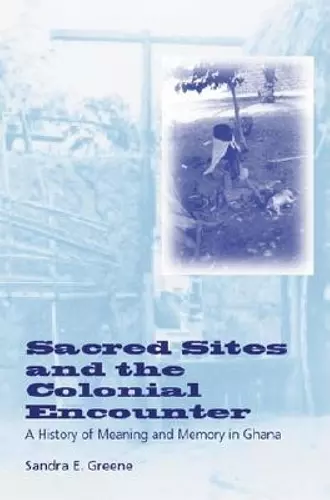Sacred Sites and the Colonial Encounter
A History of Meaning and Memory in Ghana
Format:Paperback
Publisher:Indiana University Press
Published:14th May '02
Currently unavailable, and unfortunately no date known when it will be back

How the colonial encounter reshaped landscapes of meaning and memory in Ghana.
How the colonial encounter reshaped landscapes of spiritual meaning and memory in Ghana.
"Greene gives the reader a vivid sense of the Anlo encounter with western thought and Christian beliefs . . . and the resulting erasures, transferences, adaptations, and alterations in their perceptions of place, space, and the body."
—Emmanuel Akyeampong
Sandra E. Greene reconstructs a vivid and convincing portrait of the human and physical environment of the 19th-century Anlo-Ewe people of Ghana and brings history and memory into contemporary context. Drawing on her extensive fieldwork, early European accounts, and missionary archives and publications, Greene shows how ideas from outside forced sacred and spiritual meanings associated with particular bodies of water, burial sites, sacred towns, and the human body itself to change in favor of more scientific and regulatory views. Anlo responses to these colonial ideas involved considerable resistance, and, over time, the Anlo began to attribute selective, varied, and often contradictory meanings to the body and the spaces they inhabited. Despite these multiple meanings, Greene shows that the Anlo were successful in forging a consensus on how to manage their identity, environment, and community.
This scholarly study explores the wide-ranging political and religious ramifications of German and British colonial rule over the Ewe-speaking Anlo people in southern Togo and southeastern Ghana. German Pietists from the Bremen Mission dominated the region from the mid 19th century until ousted by the British during WW I. The Germans translated the Bible into Ewe and, by applying their own völkisch (volkisch) notions to the natives, disrupted the long-term spiritual affinity between the Ewe-speaking and Akan-speaking communities in the Anlo polity. Moreover, by appropriating the town of Notsie, they desecrated the home of Mawu, the chief Anlo diety. Ewe-Anlos were told to abandon primitive customs like burying their dead under their houses and retaining faith in magic and fetishes and to take up European culture and religion if they ever hoped to become civilized. Adoption of European practices, however, rarely guaranteed acceptance. Instead, colonial pressure resulted in frustration, passive resistance, and, sometimes, open rebellion. Through it all, Greene notes, old meanings and sacred sites were not forgotten. Retained in bits and pieces, they now constitute the very foundation upon which the new is made sensible. Includes maps and photographs; highly recommended for all levels and collections. —W. W. Reinhardt, Randolp
-- Macon College * 2003jan CHOICE *This is a rich, ambitious, and rewarding work of social and intellectual history.
* Journal of the American Academy of Religion JAISBN: 9780253215178
Dimensions: unknown
Weight: unknown
224 pages